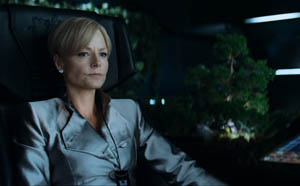|
In 2009, director Neill Blomkamp gave the world the film District 9, an allegory about apartheid that was so baldfaced it bordered on parody. Four years later, he's back with Elysium, a movie vying for the much-coveted "Product of its Time" award with such vigor that it could leave all other nominees in the dust, provided there are no additional stipulations demanding that the film be good in any other way. 
Set about a century in the future, Elysium is the tale of a divided class society, in which the wealthiest have fled the pollution-ravaged Earth to live on the eponymous space station in total luxury, the greatest of which is the presence in apparently every home of near-magical medical diagnosis and treatment machines that can repair nearly any damage. On Earth, poverty reigns and health care is in short supply. Work, what there is of it, seems limited to sweatshop labor producing goods for the citizens of the magical city in the sky. When one of these poor unfortunates, a factory worker named Max, gets exposed to a lethal dose of radiation while on the job, he accepts a deal to carry out a dangerous mission to steal high-value data from a corporate bigwig in exchange for clandestined passage to Elysium, his only hope of surviving the radiation poisoning. 
There's nothing quite so annoying as a film which agrees with your own ideas in principle, but handles them so clumsily that they become an embarrassment. Well, perhaps not nothing per se; pants full of fire ants, people who talk at the movies and the very existence of Justin Bieber could all easily be in the running, but the unfortunate fact is that Elysium puts its agenda first and everything else at about third. The two villains here, human agents aside, are greed and lack of health care. There's also some sort of commentary on immigration shoehorned in amongst the other greivances, but that initial pair is where Blomkamp's heart is this time around. I can sympathize. The control of most of the world's wealth in the hands of a small number of people isn't good for the world, and I agree that health care should be affordable for everyone. But herein lies the problem: throughout Elysium, you will hear much about powered suits and cyber-hacking, revolutionary medical technology and genetic IDs, the destitute life of those on Earth and the general indifference to this fact from the wealthy. What you really don't hear anything about is economics. Even the most ardent supporter of healthcare reform must acknowledge that there are legitimate issues concerning how it can be paid for. This does not seem to be the obstacle here. Indeed, it appears that the system is quite capable of providing medical assistance to everyone, which leaves us with the simplistic and shallow reason that it's not being provided simply because those in charge are real assholes. It's not even altogether clear what Elysium is. Is it a privately-owned space colony, or a nation unto itself? Government is another one of those pesky things that is basically never mentioned, beyond the fact that the space colony seems to have one. Is the same government in charge of the terrestrial population, a one-world government split between two worlds? Does Earth even have multiple nations, and if so, are they all mired in third-world poverty? Like Avatar before it, Elysium avoids explaining things in detail so that the situation can remain as obviously black-and-white as possible. 
Watching this film is like riding a roller coaster where the valleys are filled with water and the hilltops carry you through clouds of laughing gas; for everything enjoyable that happens in Elysium, there's something to make you wish you'd watched something else. While we learn precious little about the citizens of Elysium, beyond the fact that they never seem to be home when an illegal immigrant breaks in and uses their med table, they don't all seem to be evil incarnate. Only Jodie Foster's defense minister appears rotten to the core, but her reasons for being power-mad don't go beyond "protect the ivory tower." At a crucial moment, Max must choose between helping the world and saving himself, and chooses the selfish option, a bit of sad but believable realism I rather liked. He then gets put back on the righteous path in the most ham-handed way possible, and the needle on my appraisal gauge dips back into the deep red. When one of the ubiquitous robo-policemen asserts that he cannot "arrest a citizen of Elysium," we all must wonder what good they are, unless either Elysium has no crime, or the only crime there is being a foreigner. When your space station is open to the vaccum of space and there's nothing to keep the air in or the cosmic rays out, you might want to consider adding some quickie explanation. And when you have to have a hero learn a valuable life lesson from an adorable six-year-old girl and her story about a kindly hippo, it's time to admit you've failed in your duties as screenwriter. I don't mind films being a reflection of their times; it can make for a fascinating bit of time-capsuling. The 1979 remake of Invasion of the Body Snatchers is a great example of a sci-fi film speaking about its own day without screaming speeches from the mountaintop. It would be nice if, decades from now, people could look back at our era and think that we approached our modern issues with some degree of nuance. Here, regrettably, nuance is shown the door as quickly as an immigrant on Elysium. -review by Matt Murray
|
|
||||||||